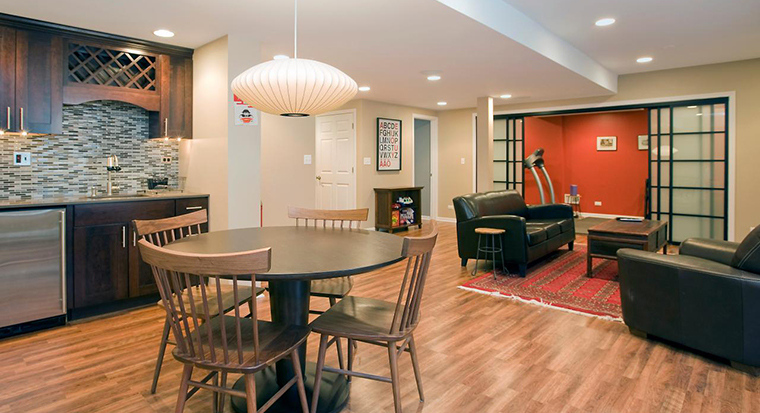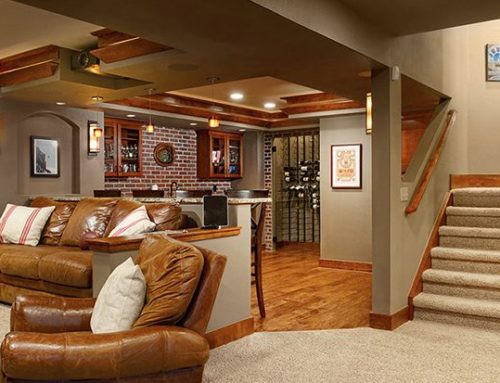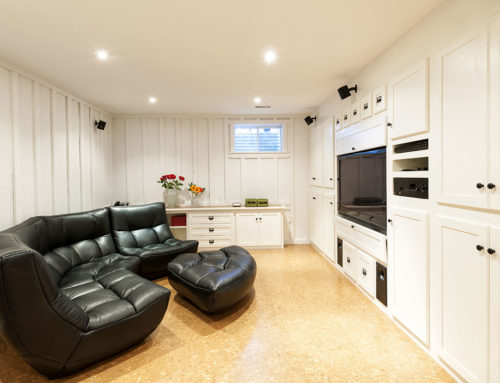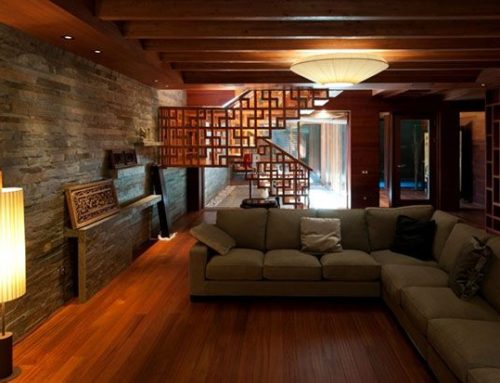Basement remodeling comes with a unique set of challenges. One of these is the floor. Basement floors play by a different set of rules from the rest of the house. Water vapor and moisture absorption is always possible even during dry weather because it is so near the ground. When the rains fall, you have a whole different set of problems, such as flooding and moisture retention. These are issues keeping home insurers busy and you away from making full use of your basement. Here are some things you should know about basement flooring and the top floor choices for basement remodeling.
What is below-grade flooring?
You might encounter the term ?below-grade flooring? used by basement remodeling contractors and get the wrong idea. It is not about the quality of the floor. Instead, this refers to the portions of the basement floor that is at ground level and vulnerable to moisture and flooding problems. In contrast, above-grade flooring is anything above ground level and safe from water damage or flooding. Below are some basic below-grade flooring facts:
- Carpets and other soft flooring materials do not perform well in basements compared to tile, concrete, and other hard alternatives
- Inorganic objects such as vinyl, concrete, and ceramic tiles outperform organic objects such as solid hardwood, even though it is a hard material
- Inorganic materials will not deteriorate over time even with exposure to water or if it grows mold, unlike organic materials such as wood and paper
- One-layer (monolithic) floors more easily than multi-layer floors, which might trap water between layers
- Concrete is both inorganic and hard, and typically used in monolithic floor systems
- Ceramic tiles can install directly on concrete slabs
- Laminate flooring require an intervening layer of foam layer between it and a concrete slab
- Carpeting and laminate flooring perform better when installed on a raised subfloor
- A raised subfloor may be a sleeper system of 2×4 wood and plywood or a prefabricated system
Top floor options
Ceramic tile
Ceramic tile is perhaps the best option for basement floors under many circumstances. It does not require finishing or other types of treatment and comes in many attractive colors and designs. You can install it directly on a concrete subfloor or install radiant heating between it and the concrete to make the tile floor warmer.
Benefits
- Non-absorbent
- Dries out quickly without sustaining damage when it floods
- DIY-friendly when dealing with a small area
- Will not rot or deteriorate over time
Drawbacks
- May become unbearably cold to the touch, and require the application of heat during the winter
- Amplifies sounds, resulting in echoes
- Large areas require professional installation
- Requires a level and smooth concrete surface as there will be no subfloor to smooth over uneven areas or other problems with the slab
Concrete
Concrete has long been a staple in buildings, but usually covered over with another material. Lately, however, people have come to appreciate this utilitarian material for its own merits. While people still stain or paint it to give it a finished look, it no longer has to hide beneath a veneer of other materials, such as ceramic tiles and wood planks.
Benefits
- Moisture resistant
- Easily available and affordable
- Putting in a subfloor is not necessary
Drawbacks
- May become unbearably cold to the touch in the winter
- Does not absorb sounds, which may be a problem if you are planning to make the basement an entertainment hub
- Requires the skills of a mason and extensive work to pour, set, and prep it for staining or paint
Vinyl
Sheet vinyl is very resilient, and some people call it by that name, and is on par with ceramic tiles and concrete as one of the preferred materials for basement floors. Vinyl flooring comes in plank or sheet form and choosing one or the other will have different looks. Sheet vinyl means fewer seams, essentially waterproofing your basement floor. Plank or tile vinyl will leave you with multiple seams, which, while attractive, does increase the risk of water permeation.
Benefits
- Water impervious
- Affordable
- Not as cold as concrete or ceramic tile
Drawbacks
- Considered cheap and flimsy
- Some issues with adhesion
- Requires professional installation when using sheet vinyl
Engineered wood
While solid wood might not be your best choice for basement flooring, you can still have the look of wood without compromising the integrity of your floors. You can choose engineered wood, which is technically still wood, but stable dimensionally. The base is a cross hatching of plywood that maintains its shape even in the presence of moisture in a limited fashion.
Benefits
- Can handle small amounts of moisture better than solid wood
- Quite attractive if you want the warmth of wood floors in your basement
- Absorbs sound very well, ideal for watching videos and listening to music
Drawbacks
- Requires nailing or stapling it to a subfloor of some kind
- Quite expensive compared to other floor materials
- Some difficulty in removal to address water damage issues
Luxury vinyl
Unlike the sheet or plank vinyl discussed earlier, luxury vinyl is more akin to engineered wood than vinyl flooring because it is thicker and looks very much like wood, although it is not. It can also look a lot like natural stone if that is the type you chose, usually marble, slate, travertine, and other dimension stones that happen to be popular.
However, unlike engineered wood, you do not nail or glue down luxury vinyl. Instead, you assemble the floor by snapping the pieces together and then placing it on top of the subfloor, floating floor style.
Wood luxury vinyl typically comes in planks 6 inches wide and 48 inches long. Stone luxury vinyl comes in 16-inch squares or smaller. In either case, you can easily assemble your own floor.
Benefits
- More durable than sheet or tile vinyl because it is twice as thick
- Warmer than concrete or ceramic tile
- Looks remarkably like wood or stone even on close inspection
Drawbacks
- Relatively high cost
- Buyer bias against vinyl floors, which may drag down perceived value of the home
- Multiple seams may increase the incidence of subfloor moisture leakage in case it floods
Conclusion
Planning a basement remodel is not the same as for other rooms in the home. Basement flooring requires special knowledge to do correctly. These top floor choices for basement remodeling is just one aspect. Consult with a basement remodeling company to do it right the first time. Mimosa Kitchen and Bath can help you make the most of basement remodeling if you are in DC metro area, Columbia, Rockville, Bethesda, Jessup, Chevy Chase and surrounding areas.
At Mimosa Kitchen and Bath, we sell high-quality products manufactured by leading brands in the industry and expert basement remodeling services. When you purchase your products from us, we guarantee speedy delivery compared to ordering from big box stores. We will also customize the product according to your specifications and install it into your kitchen quickly and with excellent artisanship.
We sell a host of products, including but not limited to cabinets, flooring, faucets and sinks, and vanities. Some of the brands we carry include Zodiaq, Fabuwood, Forevermark Cabinetry, Caesarstone, MSI, Kitchenmaid, Wolf Cabinets, Cambria and Hardware Resources. You can visit our showroom in Elliicott City, Maryland to see the many products and stone slabs we have available. This includes marble, granite and engineered quartz.
All our products come backed with brand warranties. Contact us today to get a free quote for your basement, kitchen, and bathroom remodeling!




